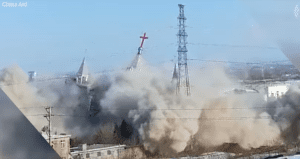Nearly 300 people were killed and hundreds more wounded after eight explosions tore through Sri Lanka in a series of coordinated blasts that struck three churches and three hotels. There were more than 500 more injured.
The first wave of attacks struck during packed Easter Sunday services between 8.45 a.m. and 9.30 a.m. local time. At St. Sebastian’s Church in Negombo more than 1,000 people had gathered for the holiest day in the Christian calendar. Christianity is a minority religion in Sri Lanka, accounting for less than 10 percent of the total population of 21.4 million.
The other churches were in the cities of Colombo, the capital, and Batticaloa. The bombs blew out the roofs and killed many worshipers. The images that have been released from the churches have been horrifying.
“You can see pieces of flesh thrown all over the walls and on the sanctuary and even outside of the church,” Father Edmond Tillekeratne, social communications director for the Archdiocese of Colombo, said.
One of the images that has gone viral is of a blood-soaked Jesus statue that sits inside the St. Sebastian church. It has become a symbol of the acts and reminds other Christians the true violence this bombing caused.
More blasts ripped through three luxury hotels in Colombo. The three hotels, the Shangri-La, Cinnamon Grand and Kingsbury, are all popular with foreign tourists and the country’s business community.
A top police official reportedly had alerted security officials 10 days earlier about a threat to churches from a radical Islamist group, National Thowheeth Jama’ath. It is still not completely clear if any precautions were taken, or who is to blame for the attack.
Security precautions are still being taken. Police have found another 87 detonators in a private terminal of the main bus station in Sri Lanka’s capital, Colombo. On Sunday evening, an improvised explosive device was defused near the capital’s Bandaranaike International Airport.
The explosions marked the country’s worst acts of violence since the end of its civil war in 2009.


